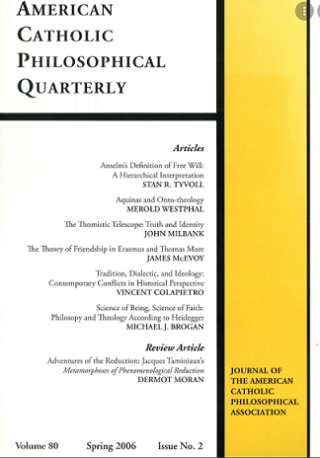-
23 May 2024 • Journal Article • Scottish Journal of Theology
Gabriel Vázquez and the moral rehabilitation of hatred
AbstractThomas Aquinas and most Christian theologians after him asserted that it is improper to attribute hatred to God. In 1598 the Jesuit theologian Gabriel Vázquez intrepidly argued that God can hate – not only with hatred of abomination but also with inimical hatred. Vázquez's surprising innovation is best explained in the context of the theological disputes between Jesuits
… show more -
Mar 2024 • Book • Early Modern Catholic Sources
On Slavery and the Slave Trade: De Iustitia et Iure, Book 1, Treatise 2, Disputations 32–40
AbstractIn his monumental On Justice and Rights, the Jesuit Luis de Molina (1535-1600) discussed the legal and ethical aspects of the Portuguese trade in African and Asian enslaved persons. Molina surveys, develops, and problematizes the criteria necessary for the legitimate possession, sale, and purchase of human freedom. He insists that, even under legally valid slavery
… show more -
Sep 2023 • Journal Article • American Catholic Philosophical Quarterly
Suárez’s Republic of Demons
AbstractSuárez was probably the first theologian to propose a political understanding of the order of subordination among the demons. According to Aquinas, this subordination immediately reflects the natural differences in perfection between the demons. Suárez charged that a natural-based order of demonic subordination could not ground the capacity of the demons’ ruler—Lucifer—to
… show more -
20 Aug 2023 • Journal Article • American Catholic Philosophical Quarterly
Suárez’s Republic of Demons : Could There Be an Obligation to Do Evil?
AbstractSuárez was probably the first theologian to propose a political understanding of the order of subordination among the demons. According to Aquinas, this subordination immediately reflects the natural differences in perfection between the demons. Suárez charged that a natural-based order of demonic subordination could not ground the capacity of the demons’ ruler—Lucifer—to
… show more -
28 Jul 2023 • Journal Article • Grotiana
Sepúlveda on the Spanish Invasion of the Americas: Defending Empire, Debating Las Casas, edited and translated by Luke Glanville, David Lupher, and Maya Feile Tomes
AbstractOn 7 July 1550 a council of fourteen leading theologians and jurists convened by the King of Spain met in Valladolid ostensibly to discuss ‘by what manner and under what laws our Holy Catholic Faith should be preached and promulgated’. In effect, however, they met to discuss the justice of the conquest of the New World and the subjection of its inhabitants. This was
… show more -
Feb 2023 • Journal Article • History of Political Thought
Neutrality and Partisanship in Civil War: Bodin, Grégoire, Lipsius and Montaigne
AbstractOne of Solon's laws punished citizens who fail to take sides in the event of a civil war. Among the very few sixteenth-century political writers who defended Solon's law we find Jean Bodin, Justus Lipsius and Michel de Montaigne (the latter two possibly reacting to Pierre Grégoire's criticism of Bodin). This article retrieves the justifications offered by these writers
… show more -
7 Dec 2022 • Journal Article • Projections of Spanish Jesuit Scholasticism on British Thought
Understanding Thomas De Quincey’s Kantian Defense of Casuistry
AbstractThomas De Quincey (x785-1859) is best known as the author of Confessions of an English Opium-Eater (1821) and one of the most important British writers of the Romantic period. De Quincey had a vast range of interests, which included, in addition to literature and poetry, philology, history, theology, political economy, and philosophy. In 1839 and 1840, De Quincey
… show more -
29 Sep 2022 • Journal Article • Journal of the History of Ideas
Seventeenth-Century Scotism and the War Just on Both Sides
AbstractCan a war can be just on both sides? Within the Western just war tradition, Catholic theologians traditionally held wars on both sides to be logically impossible. This view went unchallenged until questioned by two seventeenth-century Irish Franciscan Scotists. These were Aodh Mac Cathmhaoil (Hugo Cavellus) and John Punch. In this paper I lay out the Scotist theological
… show more -
8 Feb 2022 • Journal Article • Intellectual History Review
Moral theology and the historian’s conscience: is there a license to besmirch?
AbstractThis article examines how Catholic moral theologians analysed the constraints imposed by the rights of the dead to their good name on historical writing and research. The concern of Catholic moral theologians for persons’ rights to their good name coupled with their concern for the rights of dead persons placed serious moral constraints on the work of historians. At
… show more -
4 Jan 2022 • Journal Article • Global Intellectual History
Madariaga, probabilism and the polysynodial regime of the Spanish monarchy
AbstractThis paper examines the use of the theological doctrine of probabilism by the Valencian political writer Juan de Madariaga in his Del senado y su príncipe of 1617. Madariaga’s work is but one example of the phenomenal diffusion of probabilism in political and legal writings in seventeenth century Spain. Such popularity must be understood in the institutional context of
… show more










